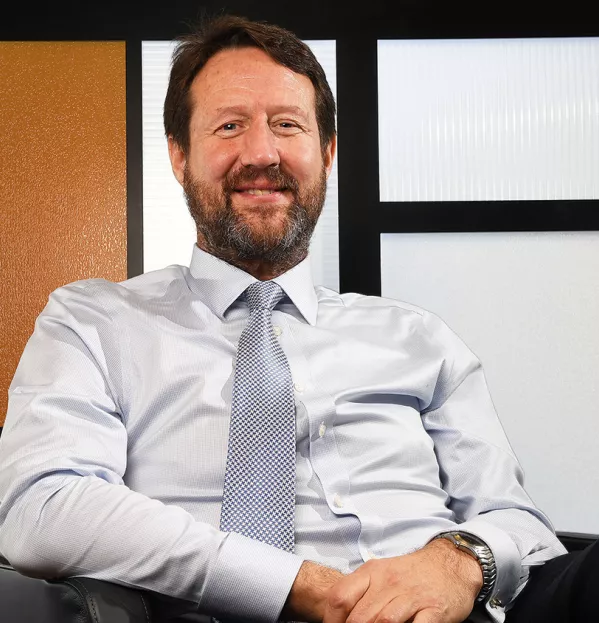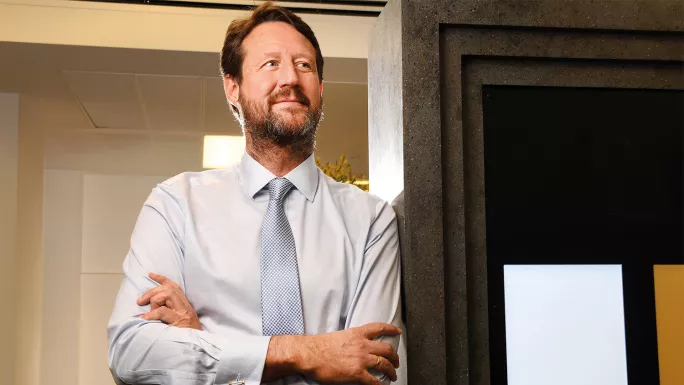‘I want us to figure on the map of international education’

A year into his leadership of England’s biggest academy chain, the scale of Julian Drinkall’s ambition is remarkable.
“I really want AET to figure on the map when it comes to people talking about international education, not just the UK,” he says.
If he succeeds, it would represent a significant turnaround. Academies Enterprise Trust has for years been the poster boy for failure in Michael Gove’s ad hoc restructuring of the school system.
It was the trust that grew too fast. It ended up under fire from Ofsted for standards and from the Department for Education for its finances. The chain has since been stripped of more than a tenth of its schools and was banned from taking on any more.
When he was appointed as the next AET chief executive in November 2016, Drinkall was under no illusions about the scale of the challenge. “The brand had been tarnished and the organisation was in really poor shape, frankly,” he says. But he quickly came to the conclusion that things were even worse than he had thought.
Drinkall was not due to take charge until March last year. “But as I got under the skin of things, I thought, ‘My God, I need to get in here rapidly.’” So he decided to take the reins two months early in January.
He reels off a litany of problems that he says the trust faced: worrying deficits, “helterskelter” governing bodies and “a real lack of and purpose and direction” at the centre.
Drinkall has certainly had an education - Eton followed by Oxford - associated with leadership at the highest level in this country.
His voice and mannerisms are reminiscent of David Cameron, but in the media he has been more closely linked to another Eton contemporary: Boris Johnson.

At Oxford, he and Johnson were drinking buddies in the notorious male-only Bullingdon dining club, and Drinkall later got the now-foreign secretary his first job. Bullingdon is clearly a source of some embarrassment today, and, when the topic is raised, he asks that Tes “be gentle with me”.
“There are some rather fabulous and great and nice people who were in there, and there were sadly some moments where people probably should have behaved better than they did,” he says somewhat ruefully.
Some might question whether this background is ideally suited to running a chain of state schools. But Drinkall does not believe his gilded start in life means he cannot understand the many deprived communities AET serves today. Quite the reverse.
When he was growing up, his parents worked for the Foreign Office and he lived in numerous developing countries. “I saw some extraordinary sights,” he says. “We were in places like Afghanistan and Jamaica, places where there are extremely poor communities operating in really tough, tough contexts. And my academic interest has very much been in things like development and social justice.”
Drinkall’s working life started in the world of media, but he says that since then “every move has been moving closer and closer to the heartland of education”. He became interested in educational publishing, then educational technology, then educational services, then educational training, and then operating schools as chief executive of the Alpha Plus group of private schools.
One notable omission from his CV is personal experience as a school teacher - although he points to a period when he taught at university. He does not think this has put him at a disadvantage running AET.
‘Leadership at scale’
With almost 300 academy trusts in England already running at least six schools, he is a test case of whether such organisations need an educationalist at the helm or someone with different skills. “The second you start to move up from five [academies] upwards, you are not looking for a headteacher,” he says, “you are looking for a leader who has got the ability to run all the complexities of an organisation.
“AET is a large trust. What I bring is leadership and managerial capability at scale. I have worked in start-up organisations, large organisations, but I have a particular specialism, I guess, in turnround, and the key thing is getting the right team around you.”
In that “turnaround”, there is one area where AET “hasn’t really ticked it all off”: getting its portfolio of schools right. It is now five years since the DfE stopped AET taking on any more schools, but the trust is still untangling the legacy of the earlier, hell-for-leather expansion.
At its peak, it had 77 academies, but eight were rebrokered in the pre-Drinkall era, and three more have followed since. He says “there are more that we are meant to have rebrokered”, quantifying the number as a deliberately vague “handful”.
“The thing that can be a little bit daunting is that rebroker and everyone goes, ‘Oh my God, AET, it’s a catastrophe.’ The point is that it’s all history stuff, and it’s stuff that we are trying to sort out so we get back to a baseline,” Drinkall adds.
His remedy to fix the organisation combined action at the level of individual schools with strategic reforms at the centre. He ordered a programme of “intensive support” for the “key academies of concern” - KAOCs in AET terminology - and implanted a 100-day strategy for a “complete turnaround plan of every aspect of the trust”, which included replacing the governing bodies at all 66 schools it then had.
Part of that reform means that now all AET principals sit on the governing bodies of one or two other AET schools, something that “has the benefit of being relatively economical, but the real thing here is that these guys all get this professional experience that is really helpful for them”.
Educationally, the picture at AET currently looks mixed. In the most recent academy trust league tables, its primary pupils made above-average progress in maths and writing, but in secondary the Progress 8 score was below average. The DfE is talking to AET about taking on new primaries, but not secondaries.
Financially, Drinkall says that on a likefor-like basis, AET halved its deficit in the past financial year, and “will end up delivering a figure that is very close to break-even” this year. A key milestone came in July when the financial notice to improve, imposed by the DfE three years earlier, was lifted.
One result of AET’s difficulties is a stronger preference at the DfE for smaller regional academy trusts over nationwide giants, but Drinkall is adamant there is a need for big players. “The regional thing is useful,” he says, because “you have got the proximity of sharing, but it doesn’t give you excellence. It gives you convenience, not excellence.”
Getting results
Drinkall is not following the example of many multi-academy trusts and setting up regional tiers - “it’s just more overhead, more management” - and instead retains his original ambition of segmenting AET’s portfolio of schools according to their characteristics. He has yet to decide how the schools will be categorised, but says one segment could be primaries that are small and isolated, and another could be those that are big and metropolitan.
“If we can develop half a dozen different models that help those different types of schools to have some comparators, some mentoring, some benchmarks, some best practice, that’s when we will start to get results,” he adds.
One model of schools he says AET is not interested in is grammar schools.
It was the big political issue when he joined the trust, and last year Drinkall told Tes that there “might be arguments for selection in certain places” (bit.ly/AETgrammars).
Now, he is at pains to separate his own views from those of AET, which he says has “got no plans to get involved in grammar schools”.
But personally, while he believes the issue is “a really marginal thing” overall, “do I think there might be one or two areas where expanding a grammar school possibly makes sense? The answer to that would be yes.”
Like most of his peers, Drinkall is highly paid, although he pointedly took a lower remuneration package than his predecessor Ian Comfort - £264,000 compared with £273,000 - as a statement of intent to do better.
Now the DfE, having been burned by the outcry over university vice-chancellor pay, is putting pressure on academy trusts to justify salaries above £150,000.
“Oh goodness,” Drinkall sighs when asked if he is worth his salary, before saying that it is for boards of trustees to decide whether their CEOs are value for money.
He offers qualified support for last month’s message from academies minister Lord Agnew that CEOs should not get greater pay rises than their teaching staff.
He waived a pay rise for himself this year, explaining that “I am thinking about my teachers and our staff, and of course I want to remunerate people fairly, but we are in sub-inflationary pay increase circumstances, and I would rather take zero because it helps me, in many ways, manage everyone else.”
But success should still be rewarded, Drinkall says: “Good CEOs’ pay should be based on performance and there will be occasions, as in any walk of life, where if someone does really well they can be [rewarded], but I think as a general rule, would you want CEO pay to go ahead of other things? Probably not.”
With a wink, he adds: “Maybe if I have done a super turnaround something will happen.”
If he succeeds in making AET the international beacon of education he desires, he might yet earn that pay rise.
You need a Tes subscription to read this article
Subscribe now to read this article and get other subscriber-only content:
- Unlimited access to all Tes magazine content
- Exclusive subscriber-only stories
- Award-winning email newsletters
Already a subscriber? Log in
You need a subscription to read this article
Subscribe now to read this article and get other subscriber-only content, including:
- Unlimited access to all Tes magazine content
- Exclusive subscriber-only stories
- Award-winning email newsletters